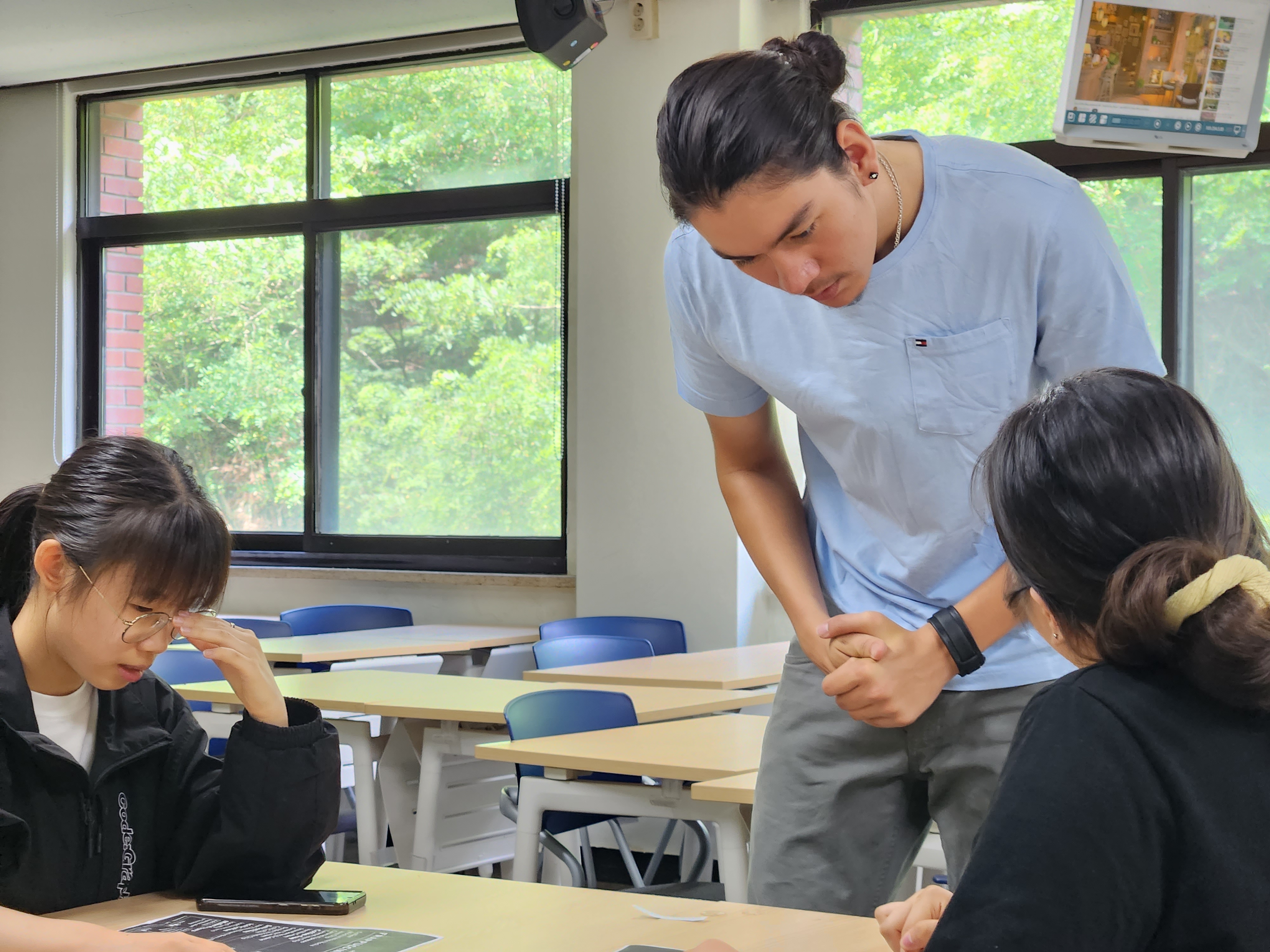 |
| ▲ Foreign Student Teaching English to Korean Students (Photo from International Affairs Team) |
In the era of 160,000 international students in South Korea, domestic universities are accelerating to attract international students in line with internationalization. According to this trend, our university is also actively executing administration to attract international students. We delved into the current status of attracting and managing international students at our university.
Currently, South Korea’s education sector is in a state of emergency. The preference for ‘In Seoul’ is becoming more intense, according to this local universities are naturally on the path of extinction. Factors such as a reduction in the number of students and a freeze of tuition fees are also some of the reasons for the disappearance of universities. However, this is not just a problem for local universities. It is unknown whether ‘In Seoul’ universities will still be strong in the future. Many universities are proposing the attraction of ‘international students’ as a complex problem’s solution. As a result, the number of international students in the country has sharply increased from about 80,000 in 2000 to 167,000 in 2022.
How about the ratio of international students at our university? Currently, excluding graduate students, Jukjeon campus has 945 international students and Cheonan campus has 174, ranking at 54th (Jukjeon campus) and 258th (Cheonan campus) nationally. Considering our university has a huge foreign language college with 10 majors of 2 departments and a total of 1,800 students, and has a FL(Foreign Language) specialization policy, these rankings are certainly disappointing results.
When combining international students from both Jukjeon and Cheonan campuses, the international students' percentage compared with the total of our university’s student population (29,279) is 3.8%. this is significantly lower than that of private universities such as Kyunghee University 14% (33,431 students), Gyeonggi University 15.5% (19,030 students), and Gachon University 10.5% (27,102 students).
International students are the ‘lifeblood’ of universities
International students are the “lifeblood” of universities. Many presidents have gone out of their way to ensure the existence of their universities. In April, Inje University’s president personally traveled to Vietnam to attract international students. Gachon University also operates the ‘Weeken Go’ cultural program to attract foreign students to Korea.
Our university has also been running programs for foreign students. Jukjeon Campus offers ‘Dandi,’ an exchange student buddy program, and Cheonan Campus offers ‘GTN,’ a club under the International Office, to help foreign students adjust to life in Korea. “Both campuses are fully aware of the importance of attracting international students,” said Jukjeon Campus’ International Exchange Team 1, who is in charge of attracting international students. “We have established a recruitment strategy that fits the local culture and education system of foreign countries and are conducting local public relations marketing,” he said, adding that he will continue to “strive to attract and manage foreign students.”
 |
| ▲ 2023 Summer Global Village Program Cheonan Campus (Photo from The Dankook Herald) |
Expanding the welfare of international students
To actively attract international students, we must strive to provide them with the living and welfare conditions they deserve. In our university, the International Student Association (ISA) is the frontline organization responsible for the rights of international students. It is a representative organization that protects the rights and interests of international students.
“The ISA holds internal meetings to collect the grievances and complaints of international students and communicate with the university so that improvements can be made,” said ISA President Fu Jialing (Senior, Advertising and Public Relations Major). “We also organize various events such as athletic competitions and cooking competitions so that students can experience a diverse study abroad life.”
In addition, Jukjeon Campus has a student organization, the DIA, which supports foreign exchange students. Kwon Goo-bin (Senior, Chemical Engineering), president of DIA, said, “We help foreign exchange students adapt by holding various cultural exchange events, such as the ‘Dandi’ program, which connects exchange students and current students through various programs, and the ‘Culture Day’ activity, where students make and share traditional foods from their home countries.”
Cheonan Campus has a service club, the GTN, under the International Office. GTN conducts various activities such as 1:1 group mentoring, international student MT, and buddy tours to help international students adapt to Cheonan Campus.
In addition, there are residential facilities for international students on both campuses. We have a comprehensive housing program for international students. Currently, the university adopts a priority selection system based on academic year and grade, and international students who are not selected for on-campus housing are also eligible for the Foreigner II Scholarship Program, which provides 80% of the cost of off-campus housing.
“As with the dormitories for general students, we prioritize the safety of our international students,” said a representative from the International Exchange Team 1. “We assign international student wardens to each dormitory to ensure smooth communication and conduct regular inspections two to three times each semester.
The level of interaction between international students and domestic students is low
Attracting international students is not the only role of our university. To continue attracting international students, our university needs to help them adjust to their new environment actively. In other words, interaction and harmony between international students and domestic students are also critical factors.
However, the harmony between international and domestic students at our university is not going smoothly. Seven posts were posted on our university's community website, EveryTime, during the second semester, expressing discomfort while interacting with international students.
Nguyen Thi Hai Anh (Junior, Dept. of International Business Administration) said, "I feel the communication barrier due to cultural and language differences. I have difficulty making Korean friends." Shin Soo-bin (Sophomore, Dept. of Animal Resources Science) said, "Even though I attend the same school as other international students, I have difficulty communicating with them."
In addition, Lim Hyun-jin (Junior, Dept. of Display Engineering) said, "I don't even have the opportunity to talk to international students unless they are mixed in the same team in team play. Even if I am on the same team, I feel anxious because of the language barrier."
TOPIK Level 3, ‘Online Korean Test’ Assessment Standard
Currently, many universities, including Dankook University (DKU), are based on TOPIK level 3 as the admission standard for international students. This is a score of 120 or more, so international students must have an intermediate Korean level to get a passing score. However, in the case of university classes, since technical terms are used rather than life terms, questions have been raised about the effectiveness of TOPIK, an indicator of international students' ability to use Korean.
In addition, in DKU, even if international students do not have a TOPIK level 3, it can replace its qualifications through an "Online Korean Test." The "Online Korean Test" presents 30 questions consisting of 20 common questions and 10 affiliation questions in advance, and about three of them are made in the actual test, if the average score of two assessment members is 60 or higher out of 100, it is passed.
Lee Joon-young (section chief of the International Education Team 1) answered the question that the test method can distinguish the Korean level of international students, he said "At DKU Global Education Center, a lecturer specializing in Korean language education is presenting questions similar to TOPIK level 3." In addition, he replied, "We are sufficiently proving the level of international students through tail-biting questions related to answers, not just asking questions presented."
DKU's Efforts for Underperforming International Students
DKU is running a "major tutoring" program for international students who cannot understand the contents of the class due to their lack of Korean skills. The major tutoring program is conducted for all departments with more than one international student. The program is conducted in a 1:1 pair of international students and excellent Korean students in the department, and not only improves their learning skills but also helps them enjoy studying through interchange with their peers and seniors in the department.
"19 out of 31 international students (61.3%) who participated in the major tutoring program in the first semester of 2023 have improved their grades compared to the second semester of 2022," said International Education Team 1. "The major tutoring program is providing practical help to international students in DKU." As for some international students with poor grades, they emphasized working together, saying, "Now in DKU, international students have to learn Korean and try to understand the class." In addition, "There is a curriculum to strengthen Korean skills for international students who have less than TOPIK level 3 or even none, and international students can get help from the TOPIK preparation class during the vacation."
Dinh Phuong Thao (Junior, Dept. of International Business Administration) who experienced the TOPIK intensive preparation class, explained the effect, saying, "The TOPIK intensive preparation class helped a lot in preparing for the TOPIK."
Our university is making efforts to attract international students and support their welfare. However, the harmony with the general students is insufficient. Organizations dedicated to international students, such as ‘DIA’ and ‘GTN,’ clearly have a positive impact on international students, but general students and international students may still be uncomfortable with each other. Therefore, it is necessary to prepare plans for solving this problem at our university. In addition to ‘DIA’ and ‘GTN,’ there should be made effort to harmonize with international students.
International students are part of our family. When one’s home is harmonious, all goes well. DKU needs to establish an accurate direction for the attraction and management of international students to cultivate the ‘Global Leaders of Challenge and Creation’ that our university aspires to.
*This article has been co-written by DKU Newspaper, The Dankook Herald, and D-voice
배서연,Dinh Phuong Thao,박지윤,서지호 dankookherald@gmail.com

 Vote for the Campus Brand Naming!
Vote for the Campus Brand Naming!

![[Campus Magnifier] Let's Surf the Library!](/news/thumbnail/202404/12496_1765_4143_v150.jpg)




